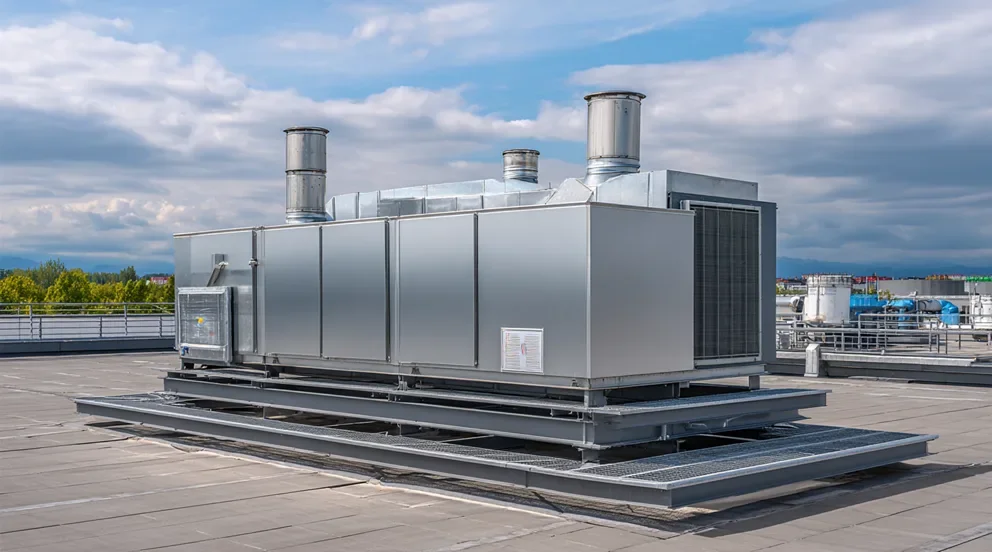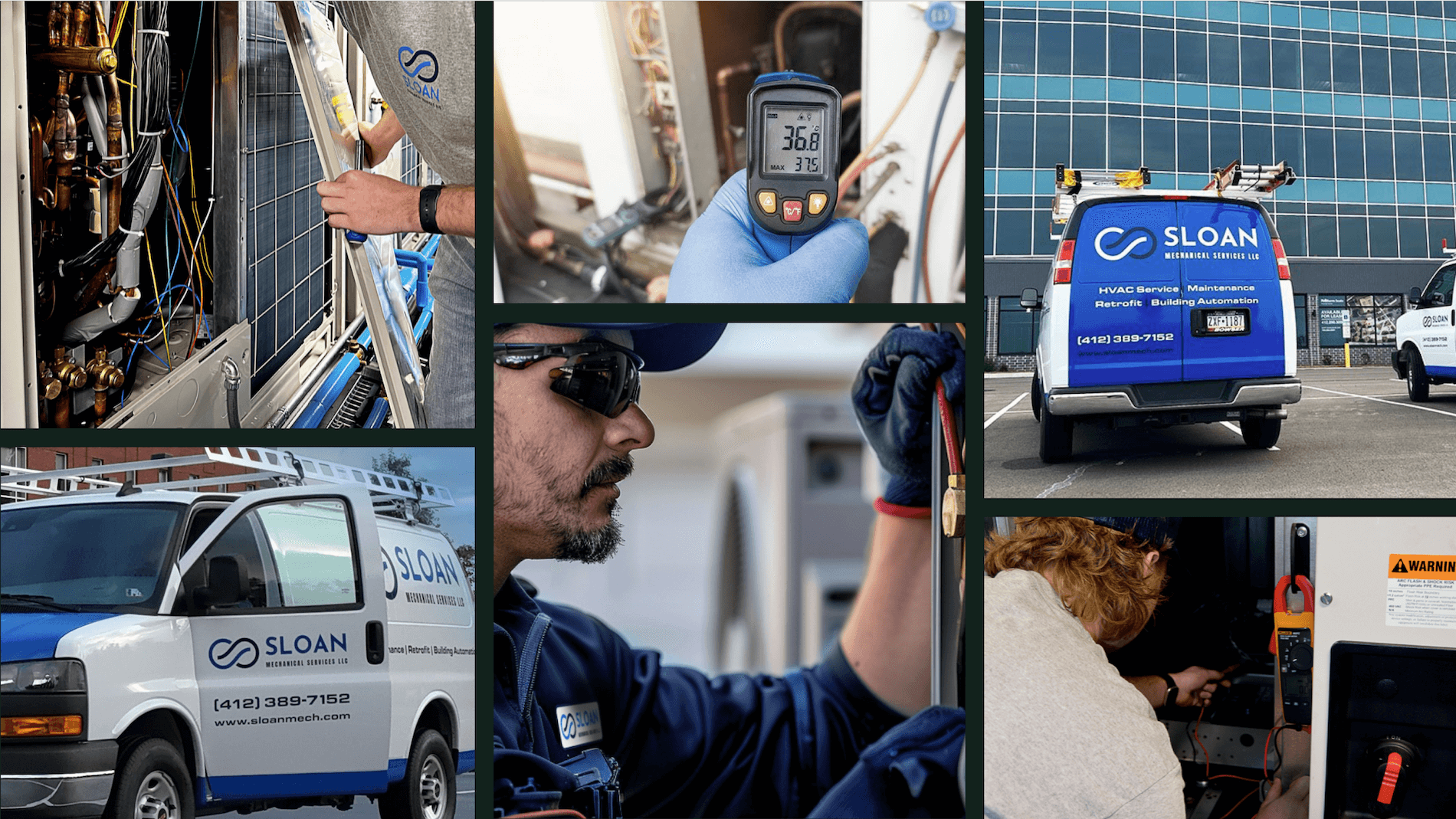The HVAC industry moves fast. Service calls pile up, customers expect quick turnarounds, and managing everything—tech schedules, invoices, and inventory—can feel like controlled chaos. If your current system is slowing you down, HVAC ERP software (Enterprise Resource Planning) can help you take back control. Designed specifically for HVAC contractors, service techs, and business owners, an ERP system connects scheduling, job tracking, invoicing, and inventory into one streamlined platform.
With the right software, you can cut wasted time, improve cash flow, and keep your techs on the move. But not all ERP solutions are built for the demands of the HVAC industry. Knowing what to look for is key. This guide covers everything you need to make the right choice:
- Choosing the right HVAC ERP Software
- 5 key features to look for in an HVAC ERP software
- Best HVAC ERP software for commercial contractors
- Best HVAC ERP software for residential contractors
- Best HVAC ERP software for general contractors
- Other notable HVAC ERP software providers
- 7 benefits of using HVAC ERP software
- 5 important HVAC ERP software FAQs answered
Picking the right ERP software starts with understanding what matters most for your business. Here’s what to consider.
Choosing the right HVAC ERP Software
Finding the right HVAC ERP software is about choosing a system that fits your business. The HVAC industry has unique challenges, from managing field teams and tracking inventory to handling invoices and keeping customers happy. Your ERP software should simplify these tasks, not make them more complicated. Here are some key factors to consider:
- Ease of use – How simple is the software for both office staff and techs in the field? Does it require extensive training, or can your team pick it up quickly? Is the mobile version just as functional as the desktop version?
- Customization and scalability – Can the software adapt to your workflow, or does it force you to change how you operate? Will it still meet your needs as your business grows, or will you outgrow it in a few years? Can you add modules or integrations later?
- Automation and efficiency – Does the system reduce manual work, or does it just shift it elsewhere? Can it automate scheduling, dispatching, and invoicing? How does it handle work orders and job tracking?
- Integration with existing tools – Can it connect with your current accounting, CRM, and scheduling tools? Does it work with the accounting software you already use? Can it sync with payroll, inventory management, or other essential systems? Will it require a complete system overhaul, or can it seamlessly fit into your current tech stack?
- Features – What essential tools does it offer? Does it have real-time job tracking, reporting, and inventory management? Are features like GPS tracking and customer communication included?
The right ERP software can transform how your HVAC business operates. Next, let’s break down the five must-have features to look for.
5 key features to look for in an HVAC ERP software
A job isn’t just about getting a technician to the site—it’s about making sure they have the right tools, the right information, and the right support to get the job done efficiently. Every HVAC contractor knows the frustration of dispatching a tech only for them to arrive unprepared, missing critical details, or struggling with paperwork. That’s where HVAC ERP software makes a real difference. It streamlines operations, eliminates wasted time, and keeps everything running smoothly. Here are five essential features to look for.
1. Smart scheduling and dispatching
A strong HVAC ERP system should simplify scheduling and dispatching by optimizing job assignments based on technician availability, location, and skill set. Instead of juggling spreadsheets or whiteboards, a dynamic system ensures techs are routed efficiently, reducing travel time and improving response rates.
Imagine an HVAC business handling emergency AC repairs during a summer heatwave. Without the right scheduling tools, jobs pile up, techs waste time driving back and forth, and customers get frustrated. With HVAC scheduling software, jobs are automatically assigned to the nearest available technician with the right skills, ensuring faster response times and better service.
2. Seamless customer management
A built-in customer management tool within an HVAC ERP system centralizes all customer interactions, service history, and equipment details in one place. This means every technician has instant access to key information before arriving on-site, reducing repeat visits and miscommunications.
Picture a technician arriving for a routine furnace check-up, only to find the homeowner complaining about inconsistent heating—something they mentioned during their last service call. Without access to past service notes, diagnosing the issue becomes a guessing game. With an HVAC CRM system, the tech can instantly review past maintenance logs and customer notes, arriving prepared and ready to resolve the issue efficiently.
3. Integrated quoting and invoicing
A well-designed HVAC ERP software should handle everything from generating quotes to finalizing invoices in a seamless workflow. With automated pricing and real-time job cost tracking, it eliminates manual errors and ensures invoices go out faster, keeping cash flow steady.
Consider an HVAC contractor finishing a commercial HVAC installation. The job is done, but the office still needs to compile labor hours, materials, and service fees before sending an invoice. This delay can stretch payments for weeks. With an HVAC invoicing system, the tech can generate an invoice on-site, collect a digital signature, and send it to the customer instantly—speeding up payments and improving cash flow.
4. Real-time reporting and analytics
Having real-time reporting in an HVAC ERP system helps business owners track job performance, technician productivity, and financial health. With automated data collection and custom dashboards, owners can make informed decisions without sorting through spreadsheets.
An HVAC company managing dozens of service calls daily wants to know which jobs are most profitable and which ones are dragging down revenue. Instead of guessing, they use HVAC reporting software to track labor costs, job completion rates, and material expenses—allowing them to fine-tune pricing and scheduling for better profitability.
5. Technician mobile access
A mobile-friendly HVAC ERP system ensures technicians can access work orders, service history, and customer details from their phones or tablets—eliminating paperwork and boosting efficiency.
Imagine a technician arriving at a job site only to realize they’re missing key job details because they were written on a paper ticket back at the office. With a mobile HVAC field service technician app, techs can pull up digital work orders, upload job photos, and even process payments—all from their mobile device, keeping them connected no matter where they are.
The right ERP software is the backbone of a well-run HVAC business. Next, we’ll explore some of the best ERP software options tailored for different types of HVAC contractors.
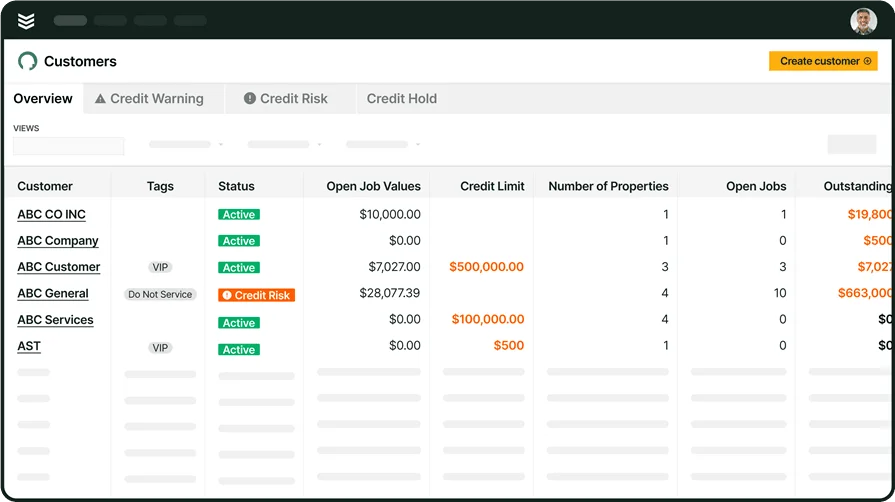
Explore our project management suite
We help teams manage projects from the very first quote to closeout.
Other valuable features for HVAC ERP software
Beyond the core features, some HVAC ERP software tools offer additional capabilities that, while not essential, can significantly improve daily operations. These features help streamline processes, reduce manual effort, and create a more efficient workflow for HVAC contractors, techs, and business owners. Here are a few worth considering:
- Fleet tracking and management – Keeping service vehicles organized helps reduce downtime and keep jobs on schedule. A fleet management system helps track locations, fuel usage, and maintenance needs, ensuring no vehicle issues disrupt service calls. With HVAC fleet tracking, dispatchers can reroute a nearby technician if a van breaks down, avoiding delays and keeping the job on track.
- Automated service agreements – Managing recurring maintenance contracts manually can lead to missed renewals and lost revenue. With HVAC service agreement software, businesses can automate reminders, renewals, and billing, making it easy to keep customers on a maintenance plan without extra admin work.
- Technician time tracking – Logging hours manually can lead to payroll discrepancies and inaccurate job costing. With HVAC time tracking tools, techs can clock in and out digitally, making payroll more accurate and providing real-time data on labor efficiency.
While these features may not be necessary for every HVAC business, they can make a big impact on efficiency, cost savings, and customer satisfaction. Next, we’ll explore the best HVAC ERP software options for commercial, residential, and general contractors.
Best HVAC ERP software for commercial contractors: BuildOps
BuildOps is designed specifically for commercial HVAC businesses, helping contractors manage everything from dispatching and scheduling to invoicing and reporting—all in one place. Unlike generic ERP systems, it’s built to handle the complexity of large-scale projects, recurring service agreements, and multi-location operations.
How Pricing Works: To explore features and discover a solution that meets your needs, we provide weekly live demos and the opportunity to schedule a customized session.
Features Beyond ERP: In addition to ERP capabilities, BuildOps includes advanced reporting tools, automated service agreements, and a fully integrated mobile app for field technicians.
What Sets It Apart For Commercial: BuildOps streamlines the workflow for large-scale HVAC operations, making it easier to track high-volume work orders, manage field teams, and maintain long-term client relationships.
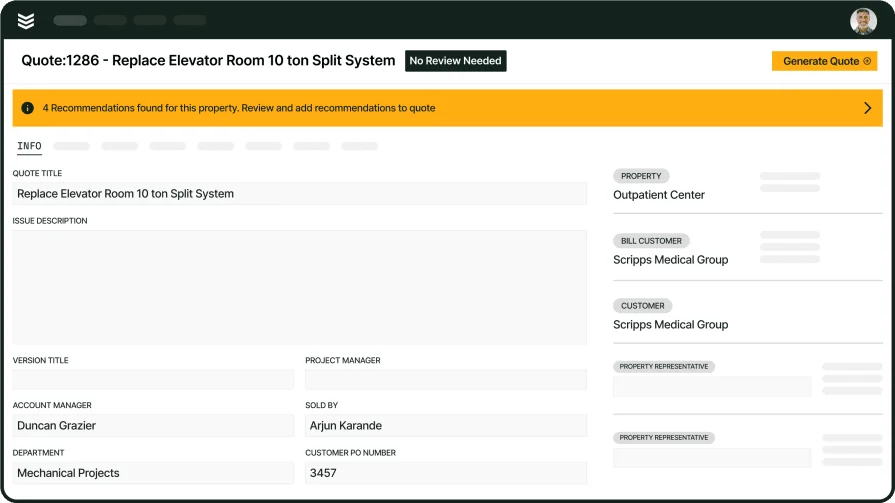
Want to take a closer look?
BuildOps keeps your jobs moving, teams connected, and business profitable.
Best HVAC ERP software for residential contractors: Housecall Pro
Image Source: Housecall Pro
Housecall Pro is a popular choice for residential HVAC businesses looking for an easy-to-use platform that handles scheduling, dispatching, and invoicing. It’s a great fit for small to mid-sized contractors who want to automate their day-to-day operations without a steep learning curve. While Housecall Pro is a strong option for residential contractors, it lacks the depth needed for businesses managing high-volume service operations. Larger HVAC companies may find its reporting and workflow automation limited compared to more advanced solutions.
How Pricing Works: Housecall Pro offers tiered pricing plans, with options based on the number of users and features required. Monthly plans typically start at an affordable rate, making it accessible for growing businesses.
Features Beyond ERP: The software includes built-in marketing tools, customer communication features, and a client self-service portal.
What Sets It Apart For Residential: Housecall Pro simplifies appointment scheduling and follow-ups, helping contractors maintain strong relationships with homeowners while keeping their service calendar full. However, it lacks the advanced operational controls and reporting features necessary for scaling commercial HVAC businesses or managing high-volume service contracts.
See how Housecall Pro and BuildOps compare directly when it comes to the needs of enterprise HVAC teams.
Best HVAC ERP software for general contractors: Jobber
Image Source: Jobber
Jobber is a versatile ERP solution that works well for general contractors handling HVAC, plumbing, and other field services. It’s designed to streamline business operations, offering job scheduling, invoicing, and team management tools. Jobber works well for general contractors, but HVAC businesses needing industry-specific tools may find it lacking in advanced service agreement management and commercial job tracking. It’s a better fit for smaller teams rather than large-scale operations handling multiple service contracts.
How Pricing Works: Jobber provides multiple pricing tiers, allowing businesses to choose a plan that aligns with their team size and operational needs.
Features Beyond ERP: The platform includes automated client reminders, GPS tracking for technicians, and seamless integration with accounting software.
What Sets It Apart For General Contractors: Jobber is a flexible solution for contractors managing multiple service types, making it easier to track different job categories and maintain an organized workflow. However, for HVAC businesses focused on high-efficiency operations, it may lack the depth of industry-specific features needed for optimizing service agreements, advanced reporting, or large-scale workforce management.
Other notable HVAC ERP software providers
While some HVAC ERP solutions offer useful tools for scheduling, invoicing, and customer management, they often fall short in handling the complexities of large-scale commercial operations. These platforms may work for smaller contractors or businesses with simpler workflows but might not provide the depth of features needed to optimize multi-location service teams, detailed reporting, or advanced project tracking. Here are a few alternatives worth considering:
Service Fusion
Image Source: Service Fusion
Service Fusion is an HVAC ERP solution designed for small to mid-sized service businesses. It offers tools for scheduling, invoicing, and customer management, making it a practical choice for companies looking to streamline their operations. However, while it’s a solid option for growing HVAC businesses, it lacks robust project management capabilities, advanced reporting, and deep customization options, which can limit scalability for larger operations.
How Pricing Works: Service Fusion offers a flat-rate monthly pricing model, which includes unlimited users—making it a cost-effective option for growing businesses.
Features Beyond ERP: The platform provides built-in VoIP phone integration, text messaging capabilities, and a customer payment portal.
What Sets It Apart For Small HVAC Businesses: Service Fusion is an affordable solution for companies that need basic ERP functionality without per-user pricing.
FieldEdge
Image Source: FieldEdge
FieldEdge is a well-known HVAC ERP software that focuses on field service management, allowing technicians to access job details, customer history, and invoices from a mobile device. While it excels in mobile functionality, it lacks the advanced analytics, workforce automation, and deep operational insights that larger HVAC businesses require to scale efficiently.
How Pricing Works: FieldEdge operates on a subscription-based pricing model, with costs depending on the number of users and selected features.
Features Beyond ERP: The software offers real-time job tracking, automated service agreements, and QuickBooks integration.
What Sets It Apart For Field Service Teams: FieldEdge is great for businesses that rely heavily on mobile access and need a simple way to manage job schedules.
SimPRO
Image Source: Simpro
SimPRO is a cloud-based ERP platform that provides job management solutions for HVAC, electrical, and plumbing contractors. It’s built to support project-based work, service scheduling, and asset tracking. However, its user interface can be complex, and its implementation process can be time-consuming—making it less ideal for contractors looking for a fast and intuitive solution. It also lacks some of the field-focused features that HVAC businesses need for real-time job tracking and seamless technician communication.
How Pricing Works: SimPRO uses a tiered pricing structure, with costs based on business size and required features.
Features Beyond ERP: The software includes inventory tracking, estimating tools, and a built-in payment processing system.
What Sets It Apart For Project-Focused HVAC Companies: SimPRO is a strong choice for contractors handling complex HVAC installations and large service contracts.
See how Simpro’s features compare to BuildOps to see which one is the better fit for your ERP business.
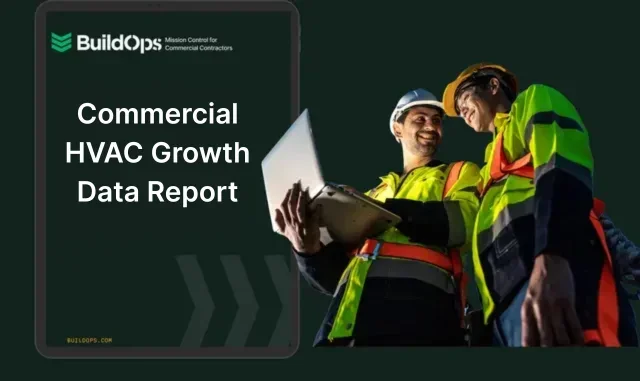
Get the HVAC growth report
See how leading HVAC professionals are able to successfully grow their business.
7 benefits of using HVAC Enterprise Resource Planning (ERP) software
Running an HVAC business means managing a nonstop flow of service calls, invoices, customer requests, and technician schedules. Keeping everything organized while ensuring efficiency can feel overwhelming—especially when relying on outdated systems or manual processes. HVAC ERP software streamlines operations, helping contractors focus on the work that matters most.
Here are seven key benefits of using an ERP system built for the HVAC industry.
1. Faster scheduling and dispatching
Coordinating service calls efficiently is a constant challenge. An HVAC field service planning software automates scheduling, ensuring jobs are assigned based on location, availability, and skill set. Instead of manually rearranging schedules, dispatchers can optimize daily operations, reducing downtime and improving response times.
For a deeper dive into improving your scheduling and dispatch process, this field service planning software guide walks through best practices for keeping technicians moving efficiently.
2. Improved cash flow with automated invoicing
Chasing down payments slows revenue collection, creating cash flow issues that impact day-to-day operations. With HVAC invoicing software, businesses can send accurate bills immediately after a job is completed, reducing delays and minimizing billing errors. Automated invoicing ensures that payment processing is seamless, allowing HVAC companies to get paid faster.
To better understand how to refine your billing process, check out this HVAC invoicing guide, which outlines strategies for reducing payment delays and eliminating invoicing mistakes.
3. Better customer relationship management
Maintaining strong relationships with customers is key to securing repeat business and growing your HVAC company. An HVAC CRM software centralizes all customer interactions, service history, and follow-ups in one place, making it easier to track client needs and maintain long-term service agreements. By having all customer data readily accessible, contractors can provide personalized service and improve customer retention.
This HVAC CRM software guide explores how better client management leads to increased service bookings and long-term loyalty.
4. Seamless integration with accounting and payroll
Manually transferring data between disconnected systems increases errors and wastes valuable time. A fully integrated HVAC ERP system connects invoicing, scheduling, payroll, and accounting into one unified platform, reducing administrative burdens and ensuring accurate financial tracking. By eliminating redundant data entry, businesses can avoid payroll mistakes, improve reporting accuracy, and streamline operations.
5. Increased technician productivity
Technicians lose valuable time searching for job details, handling paperwork, or waiting on manual job assignments. With HVAC field service ERP, they can instantly access work orders, update job statuses, and process payments from the field, minimizing unnecessary trips back to the office. This real-time access allows techs to complete more jobs per day, leading to higher efficiency and increased revenue.
To see how a structured HVAC field service ERP system improves job completion rates, explore this comprehensive guide designed for HVAC businesses.
6. Reduced operational costs
Tracking expenses, inventory, and fuel usage is crucial for maintaining a profitable HVAC business. A HVAC enterprise field service management system helps businesses monitor operational costs, optimize routes, and prevent unnecessary expenses by automating resource allocation. By reducing inefficiencies, HVAC companies can improve profit margins while maintaining high-quality service.
This guide to enterprise field service management software breaks down how cost-saving measures can be implemented through ERP automation.
7. Greater business scalability
As HVAC businesses expand, managing larger service teams, multiple locations, and high work order volumes becomes more complex. A scalable HVAC field service management system provides the tools needed to grow without the growing pains, ensuring seamless scheduling, reporting, and workforce management.
By adopting an ERP designed for scalability, HVAC companies can increase service capacity without sacrificing operational efficiency.
5 important HVAC ERP software FAQs answered
HVAC professionals have a lot of questions when it comes to ERP software—how it works, why it’s necessary, and whether it’s worth the investment. Below are answers to some of the most common questions contractors and business owners ask about HVAC ERP solutions.
1. What is HVAC ERP software?
HVAC ERP software is a business management system that helps contractors streamline operations by integrating scheduling, dispatching, invoicing, inventory, and customer management into one platform. It eliminates the need for multiple tools and manual paperwork, improving overall efficiency.
By centralizing all essential business functions, an ERP system allows HVAC companies to gain better control over job scheduling, financial tracking, and team productivity. This leads to smoother workflows, increased profitability, and better customer service.
2. How does HVAC ERP software work?
HVAC ERP software connects different aspects of a business—dispatching, accounting, payroll, and customer management—into a single system. It automates routine tasks like scheduling jobs, generating invoices, and tracking inventory, helping HVAC companies operate more efficiently.
For example, when a service call comes in, the software assigns the job to the nearest available technician, provides them with job details on a mobile app, and automatically updates records for invoicing and payroll. This seamless workflow reduces administrative burdens and keeps operations running smoothly.
3. Why do HVAC companies need Enterprise Resource Planning (ERP) software?
HVAC businesses manage multiple moving parts—technician schedules, work orders, inventory, customer records, and billing. ERP software simplifies these processes, reducing wasted time and preventing costly mistakes. It also provides real-time data, so business owners can make informed decisions about resource allocation and job profitability.
Without an ERP system, many HVAC contractors rely on spreadsheets, disconnected software tools, or manual tracking, which increases the risk of miscommunication and inefficiencies. By implementing HVAC ERP software, companies can increase productivity, reduce costs, and improve service quality.
4. Is HVAC ERP software worth the cost?
Yes, HVAC ERP software is a valuable investment because it eliminates inefficiencies, reduces administrative work, and increases profitability. While the upfront cost may seem high, the long-term savings from automating tasks, reducing errors, and improving job scheduling often outweigh the initial expense.
Many HVAC companies see a return on investment through increased job capacity, fewer missed service calls, and faster payment collection. Plus, with real-time reporting and tracking, business owners gain better financial visibility, helping them optimize operations and reduce unnecessary expenses.
5. Are there any applicable restrictions or compliance requirements when using HVAC ERP software?
Yes, depending on location and industry regulations, HVAC businesses may need to ensure their ERP software complies with data protection laws, financial reporting standards, and licensing requirements. For example, companies handling customer payment information must follow PCI compliance, while businesses managing employee payroll need to ensure tax and labor laws are met.
Additionally, HVAC contractors working with government or large commercial contracts may be required to maintain detailed records for audits and compliance checks. Choosing an HVAC ERP solution with built-in regulatory features ensures businesses stay compliant while reducing administrative burdens.
A powerful HVAC ERP software does more than just organize your business—it connects scheduling, invoicing, dispatching, and reporting into one seamless system. Many solutions cover the basics, but few offer the advanced features HVAC contractors need to manage high-volume jobs, streamline technician workflows, and keep financials in check.
For commercial service businesses, having an all-in-one ERP platform with built-in automation, integrations, and real-time data tracking is essential for scaling efficiently without the typical operational bottlenecks.
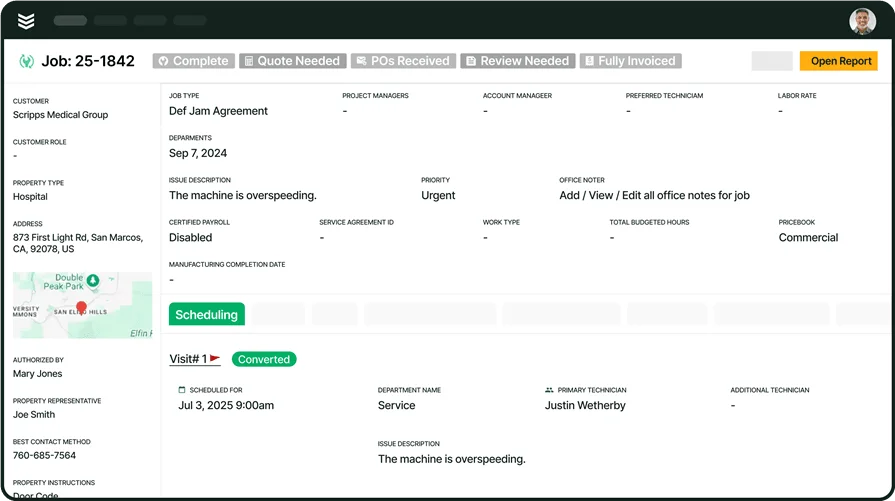
See BuildOps in action
We’re purpose-built for enterprise companies that manage large-scale jobs.



